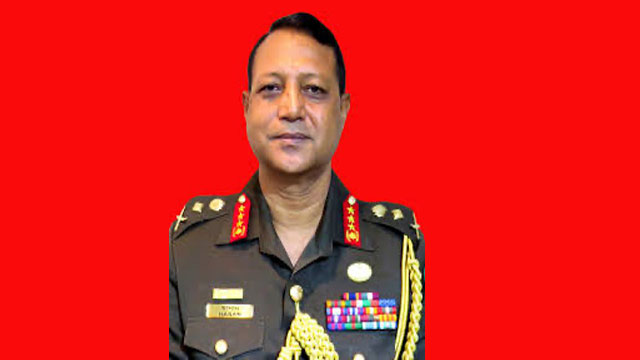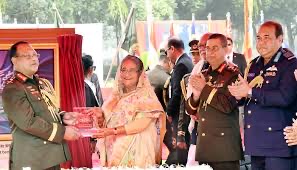A retired Lieutenant General who in recent years was in charge of Sheikh Hasina’s personal security force and the country’s most strategic infantry division says that following a video interview he gave on Tuesday, he now fears being picked up and disappeared by the country’s law enforcement agencies .

In the interview, which was broadcast live on Facebook on July 14th, Lieutenant General (Retd) Chowdhury Hasan Sarwardy spoke disparagingly about the current chief of army staff, corruption in the government and the failure to hold free and fair elections. He also criticised the role of Indian intelligence agencies in the country.
Sarwardy told Netra News on Wednesday, the day after the Facebook live interview, that he was now in hiding, but that it was only a matter of time before he would be picked up unless the international community helped him.
“I received a message, maybe from a well wisher inside the [military] agency, which was immediately deleted, that ‘they are planning to take serious actions against you, you are a serious target.’ I could understand the meaning of target — that people are being picked up, people are being kidnapped, people are being taken and there is no trace. Or they are taken and after a few days, a case is filed against him. These are the two things that may happen [to me].” Sarwardy said.
“I don’t feel any place is safe, I am just staying in a place, but nothing I safe. I am sure they know exactly [where I am] but they are waiting for a green signal from the top boss and as soon as they get it they will take me and nobody will know where they have taken me,” he said. “Everybody is saying that ‘this is the last day for you’.”
A spokesperson from the armed forces media wing, the Inter Services Public Relations Directorate, said that he “did not hear about Sarwardy speech” and that he would provide the contact details of his director. However, the director’s details were never sent.
Sarwardy said that earlier on Wednesday he had been sacked from his position as Chief Adviser at Waltons, a role which he had held for two years. “The company told me that they had received serious threat calls from agencies and the government, and were under pressure that I not be allowed to work anymore. The government have taken away my right to work, to earn money, and lead my life,” he said. At the time of publication, Waltons has not responded to a request for comment.
The retired senior army officer said that he had now become a victim of the strict laws curtailing freedom of expression in the country. “People are not allowed to tell the truth.”
Sarwardy retired from the army in May 2018 after failing to be appointed as Chief of Army Staff. For two years from 2011, he held the position of Director General of Special Security Force at the Prime Minister’s Office, after which he became commanding officer of the 9th Infantry Division of the Bangladesh Army, which is considered the most strategic formation of the Bangladesh Army as it is entrusted with the security of the capital city. His final position before retirement was as head of the National Defence College.
The military officer came to public attention in 2013 when he led the rescue operations following the collapse of the Rana Plaza building which killed at least 1,100 people, mostly garment workers
In his interview on Tuesday, given to the US based journalist Kanak Sarwar, Sarwardy criticised the government over not holding free and fair elections claiming that Bangladeshi people will never be able to vote again because of the way institutions have been set up. “I can say with certainty that it is impossible that you will see a change of government through an election,” he said.
Referring to the owners of two hospitals recently found to be providing false Covid-19 test certificates, the retired Lieutenant General said that there are many people like them who “move around with police protection, flanked by police cars. Their cars have flag stands, [police] blow whistles [to clear out the crowd for them]. They go into cantonments, they … meet with the President, the Prime Minister. They give [them] flowers. The thing is that these people have access in those places. Whereas, people like me that served the nation do not have that access. The point is that the state is aiding them in their corruption.”
He related a recent incident where he was with his wife at a tailor shop when police and intelligence officers came in and asked for the place to be vacated as a VIP was coming. On further inquiry, he said, he found out that the VIP was Joseph, the brother of Aziz Ahmed, the current Chief of Army Staff. Joseph was convicted in 2004 of murder before he was pardoned by the President in May 2018, in a rare act of clemency
“I know Joseph as a high-level criminal,” Sarwardy said in the interview. “He is a murderer and was in prison, from where he was released. He has four brothers: Haris, Anis, Tipu and the current chief of Army. One of these brothers was killed in a gun battle, and two are absconding. The government released Mr Joseph with honour. He lives in the country [and also] out of the country.”
Sarwardy said that he was “confused” seeing Joseph getting VIP treatment and getting a police escort, whereas he had recently been picked up by military officers and taken to the cantonment for two hours without any explanation. “I served the country for 40 years. But he was getting this treatment when I got [completely opposite] treatment.”
In the interview he also criticised the role of Indian intelligence agencies who he claimed were interfering in deciding appointments within the army and bureaucracy.
At the end of the interview Sarwaday said that, “I don’t think the current situation can change through another military [intervention]. I never believed that. I don’t expect this to happen either. I also don’t think this helps anything.”
In recent years, the current Awami League government have clamped down hard on criticism. In the last 6 months, according to Article 19, police have filed 113 criminal cases against a total of 208 people under the Digital Security Act (DSA)— 53 of them journalists. 114 were arrested immediately, with most still awaiting bail.
The Covid-19 epidemic has brought about a particular spate of arrests as the government seeks to punish criticism of its policies and implementation. Transparency International reports that 67 DSA cases were filed against 37 journalists for disseminating news of theft and embezzlement in relief distribution in different parts of the country. Cases under the DSA have also in recent weeks been filed against cartoonists, satirists and journalists, including the editor-in-chief of Netra News.
The army is particularly sensitive to criticism. In 2015, the military’s Directorate General Forces Intelligence (DGFI) forced the country’s major companies to stop advertising in two of the country’s major newspapers after they wrote about alleged extra judicial killings by the army in the Chittagong Hill Tracts
Secret detentions and disappearances by the country’s law enforcement agencies — including by DGFI — have also become common in Bangladesh, though this year the number of known cases has reduced from previous years. Netra News has reported on the secret detentions, apparently undertaken by DGFI, of family members and staff members of Colonel (Rtd) Shaheed Khan.-Netra News
Click below to watch the interview:
https://www.facebook.com/560237674/videos/10157699847582675/
YS






